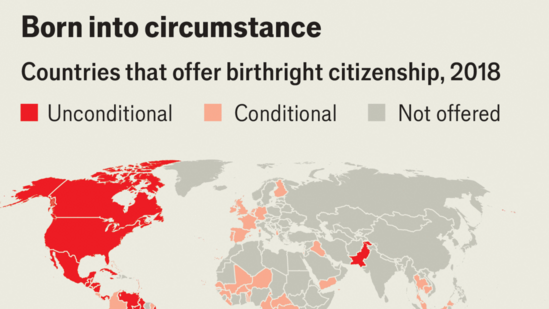Why does America have birthright citizenship?

The 14th Amendment says all those “born or naturalised in the United States, and subject to the jurisdiction thereof, are citizens”.
DONALD TRUMP’s order “boggles the mind”, a district judge remarked during the president’s first week back in the White House. He was referring to an executive order of January 20th directing that only children of citizens and permanent residents could be granted birthright citizenship. By excluding both undocumented immigrants and people temporarily working or studying in America, his directive was “blatantly unconstitutional”, said John Coughenour, who then blocked the order temporarily.

It is easy to understand his incredulity. The 14th Amendment says all those “born or naturalised in the United States, and subject to the jurisdiction thereof, are citizens”. This had long been understood to mean that any child born on American soil instantly became a citizen, no matter what the status of their parents was. Mr Trump and his allies have taken another look at the 14th Amendment’s language, however, hoping to persuade courts that it has been misinterpreted. A case touching on Mr Trump’s executive order will come before the Supreme Court in May, but that matter concerns a separate (and important) question about which judges have the power to issue nationwide injunctions while lawsuits are decided. Whenever the merits of Mr Trump’s birthright order reach the high court, the president is unlikely to be successful, legal scholars say.
Perhaps Mr Trump knows that, but relishes the fight as part of his wider political and deterrence campaign to keep out unwanted foreigners by all means possible. In any event, the struggle over his order raises questions many Americans had not previously had reason to consider: why does America have birthright citizenship, and what would happen if it were abolished?
Mr Trump is fond of saying that the United States is the only country that has such a thing. This is untrue. European countries have restrictions on birthright citizenship, but the policy is common across the Americas (see map). This Atlantic divide dates back to settler societies using birthright citizenship as “an engine of assimilation”, says Peter Spiro, a professor at Temple University’s law school. This possibility ended for many with the notorious 1857 Dred Scott Supreme Court decision, which held that black people were not and could never be Americans. The sweeping language of the 14th Amendment, passed in the wake of the civil war, sought in part to pre-empt another such ignoble ruling. Since then, universal birthright citizenship for everyone has been supported by “long-standing judicial precedent, executive branch practice, congressional practice”, says Amanda Frost, a law professor at the University of Virginia.
Born in the USA
Mr Trump’s gambit relies on work by conservative scholars who point to the sometimes overlooked “jurisdiction” language of the 14th Amendment. Whereas these words had previously been interpreted to create carve-outs for children of diplomats or Native Americans, some now see in them a requirement for parental “allegiance” to America. That is a question that deserves to be litigated, says Andrew Arthur, a former immigration judge, now at the Centre for Immigration Studies, a think-tank that favours reduced immigration. Even if Mr Trump’s defence of his executive order fails, he says, it will at least resolve a constitutional niggle that has been around for over a century.
If the president succeeds, the change would require a reinvention of America’s ramshackle, decentralised system for keeping birth records. Unlike most other countries, America has no central birth registry—instead states, counties and municipalities issue birth certificates. There are currently 14,000 different kinds in circulation. Despite this, certificates alone have been enough to prove citizenship. In a difference from European countries, just half of Americans have passports.
Consider the melodrama surrounding Real ID, a programme that has attempted to set federal standards for identification but has turned into a long-running fiasco. After a series of delays, it is set to come into force this month, a full 20 years after being passed. Remaking citizenship documentation would be even messier.
Birthright citizenship is so embedded that even estimating how many births Mr Trump’s order would affect is difficult. According to data from the Urban Institute, there are over a million American children under three with only non-citizen parents. Granting citizenship so bountifully risks incentivising young people coming to America to have families, and there is particular opposition to birth tourism, when an expectant mother comes to America exclusively to get citizenship for her child. But there are probably just a few thousand of these births a year, according to the Niskanen Centre, a think-tank.
Researchers have found that birthright citizenship does indeed increase assimilation into a country, as it did in early America. In Germany in 2000 citizenship rules changed, becoming closer to the American system and providing a kind of natural experiment. Economists found that after the reform, immigrant parents spent more time with native Germans, were able to speak more German and began enrolling their children in early education at similar rates to non-immigrant families. “It seems that assimilation outcomes in the United States are better than assimilation outcomes in Europe have been,” says Gil Guerra, of the Niskanen Centre, citing birthright citizenship as one of the causes. If Mr Trump’s order survives at the Supreme Court, then part of the ideal of America’s melting pot will survive with it.
Stay on top of American politics with The US in brief, our daily newsletter with fast analysis of the most important political news, and Checks and Balance, a weekly note from our Lexington columnist that examines the state of American democracy and the issues that matter to voters.
All Access.
One Subscription.
Get 360° coverage—from daily headlines
to 100 year archives.



HT App & Website







